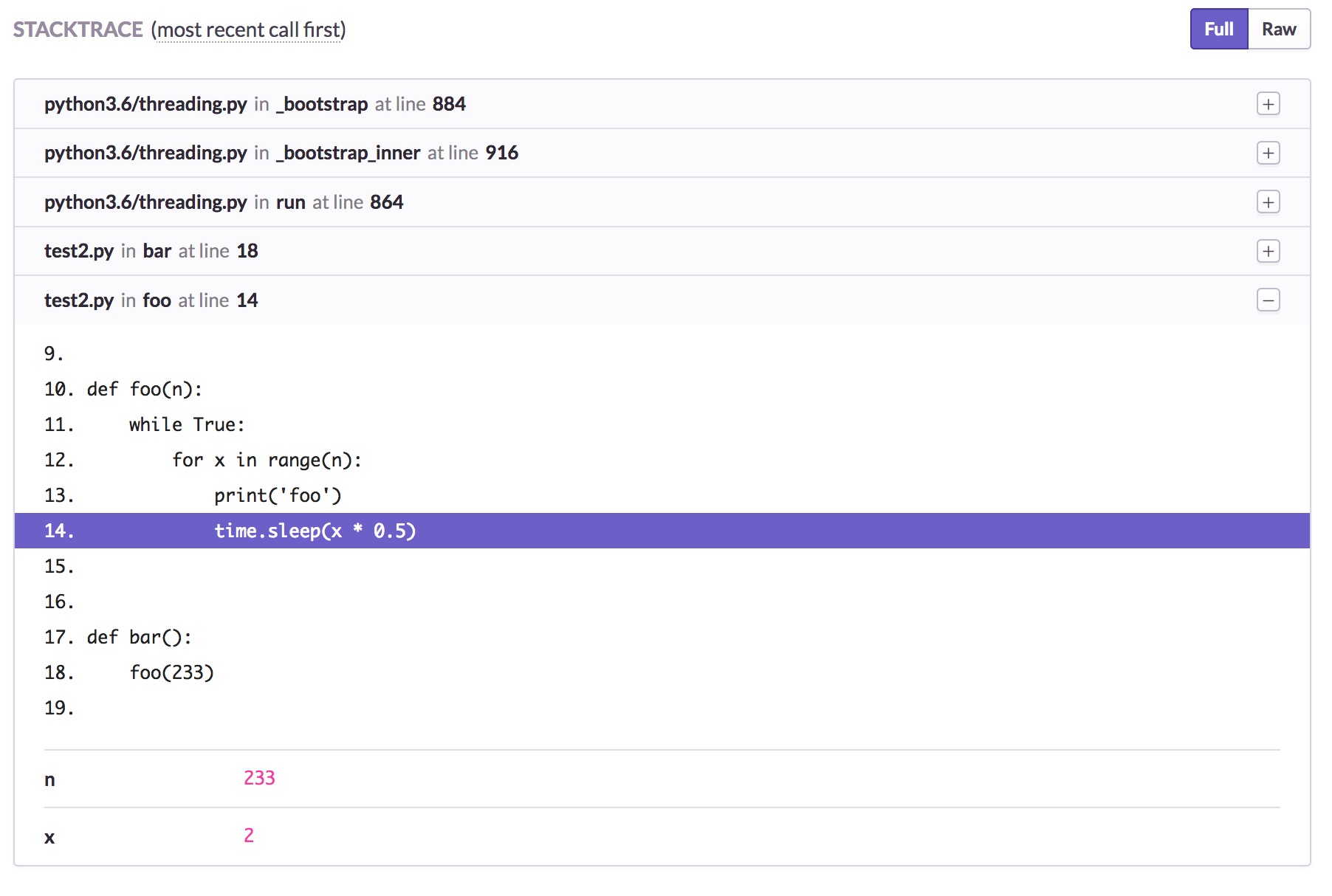本文记录如何获取多线程、多协程(gevent)、asyncio 程序中所有线程/协程的 traceback 信息。
获取所有线程的 traceback 信息¶
可以通过 threading.enumerate() 获取所有线程信息, 通过 sys._current_frames() 获取线程 traceback 信息。
测试程序:
import sys
import traceback
import threading
import time
def do(x):
x = x * 3
time.sleep(x * 60)
def main():
threads = []
for x in range(3):
t = threading.Thread(target=do, args=(x,), name='thread-{}'.format(x))
t.start()
if __name__ == '__main__':
main()
id2thread = {}
for thread in threading.enumerate():
id2thread[thread.ident] = thread
for thread_id, stack in sys._current_frames().items():
stack_list = traceback.format_list(traceback.extract_stack(stack))
print('thread {}:'.format(id2thread[thread_id]))
print(''.join(stack_list))
运行结果:
$ python test.py
thread <Thread(thread-2, started 123145466843136)>:
File "/xxx/lib/python3.6/threading.py", line 884, in _bootstrap
self._bootstrap_inner()
File "/xxx/lib/python3.6/threading.py", line 916, in _bootstrap_inner
self.run()
File "/xxx/lib/python3.6/threading.py", line 864, in run
self._target(*self._args, **self._kwargs)
File "test.py", line 9, in do
time.sleep(x * 60)
thread <Thread(thread-1, started 123145461587968)>:
File "/xxx/lib/python3.6/threading.py", line 884, in _bootstrap
self._bootstrap_inner()
File "/xxx/lib/python3.6/threading.py", line 916, in _bootstrap_inner
self.run()
File "/xxx/lib/python3.6/threading.py", line 864, in run
self._target(*self._args, **self._kwargs)
File "test.py", line 9, in do
time.sleep(x * 60)
thread <_MainThread(MainThread, started 140736955184064)>:
File "test.py", line 27, in <module>
stack_list = traceback.format_list(traceback.extract_stack(stack))
获取所有协程(gevent)的 traceback 信息¶
可以通过 gc.get_objects() 获取所有对象,然后从中过滤出所有的协程对象(greenlet.greenlet), 然后通过 greenlet 对象的 gr_frame 属性获取 traceback 信息。
测试程序:
import gc
import traceback
import gevent
import greenlet
def foo():
while True:
for x in range(10):
gevent.sleep(x * 10)
def bar():
while True:
for x in range(5):
gevent.sleep(x * 20)
def main():
for func in [foo, bar]:
t = gevent.spawn(func)
t.start()
def get_traceback():
for obj in gc.get_objects():
if isinstance(obj, greenlet.greenlet):
stack_list = traceback.format_list(
traceback.extract_stack(obj.gr_frame)
)
print('greenlet {}:'.format(obj))
print(''.join(stack_list))
if __name__ == '__main__':
main()
gevent.spawn(get_traceback).join()
运行结果如下:
$ python test.py
greenlet <Greenlet at 0x103f4ca60: bar>:
File "/xxx/lib/python3.6/site-packages/gevent/greenlet.py", line 536, in run
result = self._run(*self.args, **self.kwargs)
File "test.py", line 17, in bar
gevent.sleep(x * 20)
File "/xxx/lib/python3.6/site-packages/gevent/hub.py", line 167, in sleep
waiter.get()
File "/xxx/lib/python3.6/site-packages/gevent/hub.py", line 898, in get
return self.hub.switch()
File "/xxx/lib/python3.6/site-packages/gevent/hub.py", line 630, in switch
return RawGreenlet.switch(self)
greenlet <Greenlet at 0x103f4caf8: get_traceback>:
File "/xxx/lib/python3.6/site-packages/gevent/greenlet.py", line 536, in run
result = self._run(*self.args, **self.kwargs)
File "test.py", line 30, in get_traceback
traceback.extract_stack(obj.gr_frame)
greenlet <greenlet.greenlet object at 0x103f4c0e0>:
File "test.py", line 38, in <module>
gevent.spawn(get_traceback).join()
File "/xxx/lib/python3.6/site-packages/gevent/greenlet.py", line 496, in join
result = self.parent.switch()
File "/xxx/lib/python3.6/site-packages/gevent/hub.py", line 630, in switch
return RawGreenlet.switch(self)
greenlet <Greenlet at 0x103f4c930: foo>:
File "/xxx/lib/python3.6/site-packages/gevent/greenlet.py", line 536, in run
result = self._run(*self.args, **self.kwargs)
File "test.py", line 11, in foo
gevent.sleep(x * 10)
File "/xxx/lib/python3.6/site-packages/gevent/hub.py", line 167, in sleep
waiter.get()
File "/xxx/lib/python3.6/site-packages/gevent/hub.py", line 898, in get
return self.hub.switch()
File "/xxx/lib/python3.6/site-packages/gevent/hub.py", line 630, in switch
return RawGreenlet.switch(self)
greenlet <Hub at 0x103f4c9c8 select default pending=0 ref=2>:
File "/xxx/lib/python3.6/site-packages/gevent/hub.py", line 688, in run
loop.run()
获取所有 asyncio task 的 traceback 信息¶
可以通过 asyncio.Task.all_tasks() 获取所有 asyncio task 对象, 然后通过 task 对象的 get_stack() 方法获取 traceback 信息。
测试程序:
import asyncio
import traceback
async def foo():
while True:
for x in range(10):
print('foo')
await asyncio.sleep(x * 10)
async def bar():
while True:
for x in range(5):
print('bar')
await asyncio.sleep(x * 20)
async def get_traceback(loop):
await asyncio.sleep(1)
for task in asyncio.Task.all_tasks(loop):
stack_list = []
for stack in task.get_stack():
stack_list.extend(
traceback.format_list(traceback.extract_stack(stack))
)
print('asyncio task {}:'.format(task))
print(''.join(stack_list))
if __name__ == '__main__':
event_loop = asyncio.get_event_loop()
try:
tasks = [foo(), bar(), get_traceback(event_loop)]
event_loop.run_until_complete(asyncio.wait(tasks))
finally:
event_loop.close()
运行结果如下:
bar
foo
bar
foo
asyncio task <Task pending coro=<wait() running at /xxx/lib/python3.6/asyncio/tasks.py:307> wait_for=<Future pending cb=[<TaskWakeupMethWrapper object at 0x10c57c258>()]> cb=[_run_until_complete_cb() at /xxx/lib/python3.6/asyncio/base_events.py:176]>:
File "/xxx/lib/python3.6/asyncio/tasks.py", line 307, in wait
return (yield from _wait(fs, timeout, return_when, loop))
asyncio task <Task pending coro=<bar() running at test.py:16> wait_for=<Future pending cb=[<TaskWakeupMethWrapper object at 0x10c57c378>()]> cb=[_wait.<locals>._on_completion() at /xxx/lib/python3.6/asyncio/tasks.py:374]>:
File "test.py", line 16, in bar
await asyncio.sleep(x * 20)
asyncio task <Task pending coro=<get_traceback() running at test.py:27> cb=[_wait.<locals>._on_completion() at /xxx/lib/python3.6/asyncio/tasks.py:374]>:
File "test.py", line 35, in <module>
event_loop.run_until_complete(asyncio.wait(tasks))
File "test.py", line 35, in <module>
event_loop.run_until_complete(asyncio.wait(tasks))
File "/xxx/lib/python3.6/asyncio/base_events.py", line 454, in run_until_complete
self.run_forever()
File "test.py", line 35, in <module>
event_loop.run_until_complete(asyncio.wait(tasks))
File "/xxx/lib/python3.6/asyncio/base_events.py", line 454, in run_until_complete
self.run_forever()
File "/xxx/lib/python3.6/asyncio/base_events.py", line 421, in run_forever
self._run_once()
File "test.py", line 35, in <module>
event_loop.run_until_complete(asyncio.wait(tasks))
File "/xxx/lib/python3.6/asyncio/base_events.py", line 454, in run_until_complete
self.run_forever()
File "/xxx/lib/python3.6/asyncio/base_events.py", line 421, in run_forever
self._run_once()
File "/xxx/lib/python3.6/asyncio/base_events.py", line 1425, in _run_once
handle._run()
File "test.py", line 35, in <module>
event_loop.run_until_complete(asyncio.wait(tasks))
File "/xxx/lib/python3.6/asyncio/base_events.py", line 454, in run_until_complete
self.run_forever()
File "/xxx/lib/python3.6/asyncio/base_events.py", line 421, in run_forever
self._run_once()
File "/xxx/lib/python3.6/asyncio/base_events.py", line 1425, in _run_once
handle._run()
File "/xxx/lib/python3.6/asyncio/events.py", line 126, in _run
self._callback(*self._args)
File "test.py", line 35, in <module>
event_loop.run_until_complete(asyncio.wait(tasks))
File "/xxx/lib/python3.6/asyncio/base_events.py", line 454, in run_until_complete
self.run_forever()
File "/xxx/lib/python3.6/asyncio/base_events.py", line 421, in run_forever
self._run_once()
File "/xxx/lib/python3.6/asyncio/base_events.py", line 1425, in _run_once
handle._run()
File "/xxx/lib/python3.6/asyncio/events.py", line 126, in _run
self._callback(*self._args)
File "test.py", line 25, in get_traceback
traceback.format_list(traceback.extract_stack(stack))
asyncio task <Task pending coro=<foo() running at test.py:9> wait_for=<Future pending cb=[<TaskWakeupMethWrapper object at 0x10c57c3d8>()]> cb=[_wait.<locals>._on_completion() at /xxx/lib/python3.6/asyncio/tasks.py:374]>:
File "test.py", line 9, in foo
await asyncio.sleep(x * 10)
知道了获取 traceback 信息的方法后有啥用呢?traceback 信息对我们调试程序有非常大的帮助,尤其是调试运行中的进程。
如果觉得 traceback 信息里包含的东西有点少的话,可以对 traceback 进行加工: 使用 raven 展开 traceback 信息,并把这些信息发送到 sentry 。
使用 raven 展开和收集 traceback 信息¶
通过 raven 可以获取 traceback 信息中的源代码及局部变量, 这些信息对应快速诊断问题非常的有帮助。同时我们还可以通过 raven 把信息发送到 sentry 中方便归档及可视化查看 traceback 信息。
测试程序:
import sys
import threading
import time
import traceback
from raven import Client
from raven.utils.stacks import get_stack_info
def foo(n):
while True:
for x in range(n):
print('foo')
time.sleep(x * 0.5)
def bar():
foo(233)
def main():
t = threading.Thread(target=bar, name='bar')
return t
def get_traceback(raven_client):
id2thread = {}
for thread in threading.enumerate():
id2thread[thread.ident] = thread
for thread_id, stack in sys._current_frames().items():
frames = traceback.walk_stack(stack)
stacktrace = get_stack_info(frames)
thread = id2thread[thread_id]
print('thread: {}'.format(thread))
print(raven_client.captureMessage(
'traceback from {}'.format(thread),
stack=True,
data={
'stacktrace': stacktrace,
},
extra={
'thread': thread,
}
))
if __name__ == '__main__':
raven_client = Client()
t = main()
t.start()
time.sleep(1)
get_traceback(raven_client)
t.join()
测试结果:
$ python test2.py foo foo foo thread: <Thread(bar, started 123145482194944)> e800cefdc2ce4a00bb716b8342c75a96 thread: <_MainThread(MainThread, started 140736955184064)> 86b0cb00d5884cb49ba033d83e21040f foo foo
sentry 上的信息:

参考资料¶
- 17.1. threading — Thread-based parallelism — Python 3.6.4rc1 documentation
- 29.1. sys — System-specific parameters and functions — Python 3.6.4rc1 documentation
- 29.9. traceback — Print or retrieve a stack traceback — Python 3.6.4rc1 documentation
- greenlet: Lightweight concurrent programming — greenlet 0.4.0 documentation
- 29.11. gc — Garbage Collector interface — Python 3.6.4rc1 documentation
- 18.5.3. Tasks and coroutines — Python 3.6.4rc1 documentation
- getsentry/raven-python: Raven is a Python client for Sentry (getsentry.com)
Comments